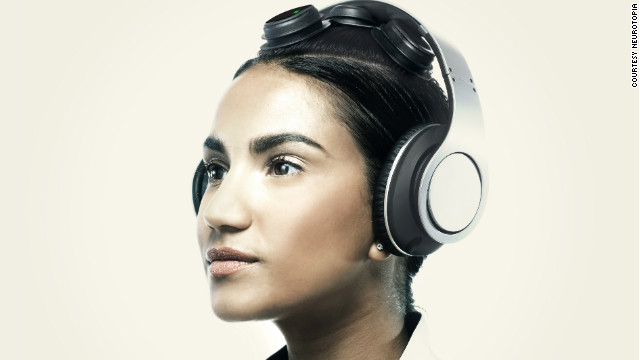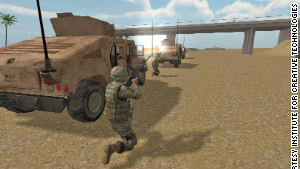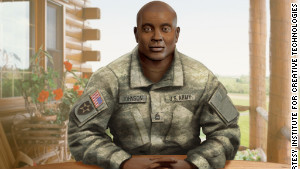 Neurotopia recently began beta-testing a dry sensor, mobile headphone and tablet system that would map brain waves
Neurotopia recently began beta-testing a dry sensor, mobile headphone and tablet system that would map brain waves
Editor's note: CNN
contributor Amanda Enayati ponders the theme of seeking serenity: the
quest for well-being and life balance in stressful times. She delivered a
version of this piece as a talk at Stanford's Medicine X conference last week.
(CNN) -- Train the brain. Until recently, this
phrase made me picture Neo from "The Matrix" proclaiming "I know kung
fu" after he had martial arts abilities uploaded into his brain.
But what if we really could harness technology, Neo-style, to help train our brains to better cope with everyday stress?
For many of us, the days
seem to pass in one anxiety-ridden blur after another. Mental health
professional increasingly agree that these daily sprints, accompanied by
a soundtrack of endless beeps, chirps and vibrations emitting from
various devices, set off our stress systems, keeping us in a persistent
and physiologically damaging state of fight-or-flight.
"The way we live our
lives now is like running marathons," said Dr. Leslie Sherlin, a
neuroscientist and chief science officer of Neurotopia, a company that
provides brain training to athletes. "And in some ways, that's great,
but you can't run marathons all the time."
Keep that pace, says Sherlin, and at some point, you will burn out. You may also suffer from a weakened immune system that can lead to an increased risk of disease.
Most of us have received
some kind of formal instruction about diet, exercise, the birds and the
bees. So why aren't we training our brains to better manage stress?
Some of the most
compelling training to help prepare people to better handle stress is
going on right now with athletes and soldiers.
For these two distinct
groups, performance under high stress is a must (albeit for very
different reasons). But the technologies being used to train them could
benefit the rest of us as well.
Technology could help us reduce stress, too
Training athletes for the field
I became interested in
the way athletes train for peak performance in high-stakes environments
last year, when I interviewed Michael Gervais, a sports psychologist who
works with Sherlin to train elite athletes to perform optimally during
high-stress competition. Gervais and Sherlin work with athletes from the NFL, NBA and NHL as well as Olympians, golfers and many others.
What Gervais told me
then was that the key to high performance was a disciplined mind. While
not exactly news, the methods Gervais and his colleagues use to teach
mental discipline were quite interesting. They were using older Eastern
disciplines like mindfulness, presence, meditation, deep breathing and
neurofeedback.
The way we live our lives now is like running marathons. ... In
some ways, that's great, but you can't run marathons all the time. Dr. Leslie Sherlin, chief science officer of Neurotopia
As part of their
training, Gervais and his colleagues hook up athletes to electrodes and
perform a baseline qEEG: a quantitative electroencephalogram. They use
the results to create an individualized brain map.
The map helps these
sports psychologists assess and quantify mental aspects of performance
like focus, decision speed, reaction time and stress regulation.
Once the brain is
mapped, the psychologists conduct half-hour neurofeedback sessions to
teach athletes how to reach optimal brain wave patterns. In a typical
session, the athlete will sit before a large screen as sensors
monitoring electrical activity in his or her brain are placed on the
scalp.
The athlete then focuses
on achieving desirable brain wave patterns that, in turn, influence
what happens on the screen. It's bit like controlling a video game with
only your thoughts. The version I saw involved cars racing through a
desert.
The training is meant to
teach athletes how to respond quickly to stressor stimuli, how to focus
during stressful situations, how to recover from errors and finally how
to shut down and still their minds when it's all over.
These sports
psychologists have collected a proprietary brain bank of assessments
over years of working with elite athletes. They use the brain bank to
identify optimal brainwave patterns associated with the highest levels
of performance.
According to Sherlin, it
takes roughly 15 to 20 neurofeedback sessions for elite athletes to
learn some of these techniques. (Probably about 30 for you and me, he
says.)
Your questions about stress, answered!
Originally developed as a
technique to measure brain activity in NASA pilots during flight
simulation exercises, neurofeedback has shown promising initial results
for helping retrain the brainwaves of children with ADHD and autism and
people suffering from chronic migraines. In one study, student eye
surgeons were trained to significantly improve their surgical skills by
regulating their own brainwave activity.
The method is being
examined in a diverse number of other contexts, including to help
relieve symptoms of chemotherapy-induced nerve damage. Controlled,
randomized trials will help validate these promising starts.
The kind of training
that the athletes working with Gervais and Sherlin receive is not
available to most of us right now, but it may be in our near future.
A few weeks ago,
Sherlin's company, Neurotopia, began beta-testing a dry (no goo in your
hair) sensor, mobile headphone and tablet system that purports to do the
same kind of assessment and training as the older model. At least in
theory, this might make the product accessible to the rest of us.
Training soldiers for the battlefield
A conversation with Dr.
Albert "Skip" Rizzo, psychologist and research professor at the
University of Southern California Keck School of Medicine, is like a
lesson in applied science fiction, with your mind reeling from "Star
Trek" to the original "Total Recall."
Except Rizzo's jaw-dropping efforts are not fiction, nor are they "on the horizon." They are here, now.
In a collaboration
between the military, Hollywood and USC's Institute for Creative
Technologies, where he serves as the associate director for medical
virtual reality, Rizzo and his colleagues have developed cutting-edge
gaming and virtual reality technologies to serve the clinical needs of
soldiers.

Virtual Iraq (and Afghanistan) are based on exposure therapy, which has been effective in the treatment of PTSD.
One project, Stress
Resilience in Virtual Environments (STRIVE), helps train service members
to have better resilience and emotional coping skills in realistic
virtual-reality combat scenarios before they are exposed to the real
stresses of combat.
A second project, called
Virtual Iraq (there is also a Virtual Afghanistan), helps soldiers
returning from combat work through their trauma by donning a helmet
geared with video goggles, earphones and a scent machine, and revisiting
the scene in a virtual reality setting, complete with sound and smell.
Both STRIVE and Virtual Iraq (and Afghanistan) are based on exposure therapy, which has been effective in the treatment of post-traumatic stress disorder.
The problem with PTSD is
that the person often avoids anything that reminds them of the trauma,
and this avoidance begins to generalize to everyday things, says Rizzo.
"It's a snowball cascade
effect. The things that evoke the fear and anxiety are no longer
directly tied to the original trauma but generalized to the outside
world. You see people with PTSD who will no longer leave their house,
and if they do, they're a nervous wreck."
The idea, says Rizzo, is
to re-create the stressful environment in a doctor's office, to help
the patients confront and challenge the trauma and to give them the
tools to better cope emotionally with what happened.
Both of these technologies require specialists and a clinical setting, but SimCoach, a "virtual human" designed for interactive use on the Internet, does not.
Though at this point,
SimCoach is targeted toward active-duty military personnel, veterans and
their families, it may also have wider utility for everyday stress and
anxiety.
SimCoach users can
select one of several avatars to talk to when they are feeling stressed
out. The virtual human coaches can serve as an "online companion for
anyone who may be too introverted to seek help, someone who may not want
to reach out to a clinician or who may feel stigma about seeing a
therapist," said John Hart, program manager at the Institute for
Creative Technologies.

SimCoach users can select one of several avatars to talk to when they are feeling stressed out
"SimCoach is not a
doc-in-the-box, and it's not going to make a diagnosis," Hart observed.
Nor is it meant to replace human interaction.
What SimCoach does do is
help those suffering from stress and anxiety symptoms begin the
conversation about what they may be going through. It may also provide
users with more information about what they may be experiencing, suggest
local facilities where they can go for care and perhaps even walk them
through breathing exercises or stress reduction techniques.
Hart summed up what I
find most compelling about SimCoach: "Here we are, sitting on a mountain
of valuable information about what to do when you're stressed or
feeling depressed. You can see how SimCoach can help people access the
right information when they need it."
Imagine the
possibilities! An interactive virtual-reality source for information on
stress, anxiety and PTSD -- the precursor, perhaps, to a real-life
version of "Star Trek's" Emergency Medical Hologram Doctor.
Home sweet home
I recently attended a
conference in Portugal. As I made my way through customs at Philadelphia
International, a customs agent asked me what I did for a living.
"I write," I said, "mostly about stress."
He stared me down for
few moments before saying in a low, gruff tone: "If you really want to
understand stress, then you need to spend a day with us here."
And here's the thing:
Regardless of what we do, most of us are feeling that same way about our
runaway lives. The genie is out of the bottle, and there is little
likelihood of us ever going back to a simpler time (if there ever was
such a thing).
So, yes, let's discuss
technology addiction, always being "on," tech fasting and the need to
design devices and apps for greater serenity. But let's also consider
how to harness some of these technologies to help us move easier in this
new world, Neo-style.
No comments:
Post a Comment